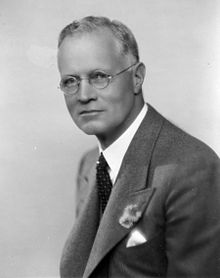
Back روبيرت چيمس مانيون ARZ Robert James Manion German Robert James Manion French Манион, Роберт Джеймс Russian
This article includes a list of references, related reading, or external links, but its sources remain unclear because it lacks inline citations. (January 2023) |
Robert James Manion | |
|---|---|
 | |
| Leader of the Opposition | |
| In office November 14, 1938 – March 25, 1940 | |
| Preceded by | R. B. Bennett |
| Succeeded by | Richard Hanson (acting) |
| Leader of the Conservative Party | |
| In office July 7, 1938 – May 13, 1940 | |
| Preceded by | R. B. Bennett |
| Succeeded by | Richard Hanson (acting) |
| Member of Parliament for London | |
| In office November 14, 1938 – March 25, 1940 | |
| Preceded by | Frederick Cronyn Betts |
| Succeeded by | Allan Johnston |
| Member of Parliament for Fort William (Fort William and Rainy River; 1917–1925) | |
| In office December 17, 1917 – October 13, 1935 | |
| Preceded by | Riding created |
| Succeeded by | Dan McIvor |
| Personal details | |
| Born | November 19, 1881 Pembroke, Ontario, Canada |
| Died | July 2, 1943 (aged 61) Ottawa, Ontario, Canada |
| Political party | Conservative |
| Other political affiliations | Unionist (1917-1921) |
| Spouse |
Yvonne Desaulniers (m. 1906) |
| Children | 3 |
| Alma mater | Queen's University, Kingston Ontario and at the University of Edinburgh |
| Occupation | Physician |
| Military service | |
| Allegiance | |
| Branch/service | Canadian Army |
| Years of service | 1916-1918 |
| Rank | Captain |
| Battles/wars | World War I |
Robert James Manion PC MC (November 19, 1881 – July 2, 1943) was a Canadian politician who led the Conservative Party of Canada from 1938 to 1940. Prior to his leadership of the party, he served in Prime Minister Arthur Meighen and R. B. Bennett's cabinets.
A Liberal prior to World War I, Manion was elected to the House of Commons in 1917 as a member of the pro-conscription Unionist Party led by Prime Minister Robert Borden. After the war, he served as a Conservative Member of Parliament until his defeat in 1935. In 1938, Manion was elected leader of the Conservatives, which was shortly relabeled as National Government. Despite his pro-conscription stance in World War I, Manion campaigned against conscription in World War II in the 1940 federal election. Manion also ran on a platform of forming a wartime coalition national unity government. In the election, the National Government lost in a landslide, keeping their seat count exactly the same as in the 1935 federal election. Manion also lost his seat of London, and subsequently resigned as leader. Shortly after, Manion was appointed director of Civilian Air Raid Defence. He died in 1943 in Ottawa.